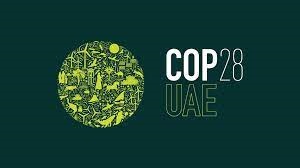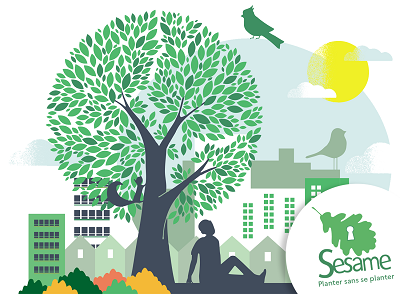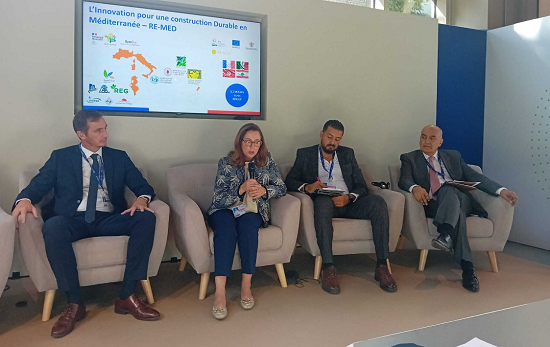
Cerema presented three projects deployed nationally and internationally: SESAME, a tool for selecting plant species to be planted in cities; RE-MED, a trans-Mediterranean project to set up recycling channels for building and public works materials; and EICPAD (Expertise, Ingénierie et Compétences au service des Politiques d'Aménagement durable des territoires francophones), an inter-regional cooperation programme for sustainable development.
 Cerema, whose work focuses on adapting territories to climate change in all its areas of expertise, was present at COP 28, the 28th Conference of the Parties on Climate Change, held in Dubai from 30 November to 12 December.
Cerema, whose work focuses on adapting territories to climate change in all its areas of expertise, was present at COP 28, the 28th Conference of the Parties on Climate Change, held in Dubai from 30 November to 12 December.
This major event, which brought together decision-makers from 197 countries to make progress in implementing the ecological transition, also provided a forum for a wide range of exchanges, both on research projects and operational feedback, with a view to sharing knowledge and good practice worldwide.
Trees as a lever for adapting cities to the impacts of climate change
 On the pavilion of the International Union for Conservation of Nature (IUCN), Franck Charmaison, Director of European and International Relations at Cerema, presented the SESAME project (Eco-systemic services rendered by trees, modulated according to species), a tool that enables those involved in development to know which tree and shrub species are suitable for planting according to their characteristics and needs.
On the pavilion of the International Union for Conservation of Nature (IUCN), Franck Charmaison, Director of European and International Relations at Cerema, presented the SESAME project (Eco-systemic services rendered by trees, modulated according to species), a tool that enables those involved in development to know which tree and shrub species are suitable for planting according to their characteristics and needs.
Initially designed, in partnership with the city and metropolitan area of Metz, for the climate of eastern France, the tool is gradually being rolled out to other regions and climatic zones, in partnership with local authorities and stakeholders. Under favourable growing conditions, not all plants are equal: the morphology of a tree, the structure of its crown, leaves and roots, its ecology and appearance make it attractive for certain services, but not all.
The city is a very difficult environment for trees: redevelopment, unstructured and compacted soils, poor water supply, drought, heat, injuries, etc. Climate change is expected to make the situation even more difficult.
SESAME now has a dozen variants across France (Eurométropole de Metz, Bordeaux Métropole, Marseille, Paris, Libourne .... etc.).
Rolling out the circular economy by creating local supply chains

The aim of the RE-MED trans-Mediterranean project, coordinated by Cerema and funded by the European Union, was to support the Tunisian and Lebanese authorities in setting up circular economy channels for building and public works materials. This project, which was presented by Oumaya Marzouk, Circular Economy Project Director at Cerema, during two side events, responds to environmental issues, of course, by promoting the recycling and reuse of materials, and economic issues, as it responds to the need for materials and creates local jobs.
These two side events were:
- "The Circular Economy and the Example of How the Construction Sector Entered Into Green Era by Applying the Principles of Circular Economy" at the Mediterranean Coalition Office on 03/12 - (The Circular Economy and the Example of How the Construction Sector Entered Into Green Era by Applying the Principles of Circular Economy)
- "Sustainable construction in the Mediterranean region and West Africa" at the France Pavilion on 06/12.
Tunisian Environment Minister Leila Chikhaoui, whose departments are heavily involved in the initiative, opened the round table with a video address in which she stressed the importance of the circular economy in construction, with a view to resilience and adaptation to the impacts of climate change. She also spoke about the RE-MED project, which had a strong operational aspect and, among other achievements, produced a section of road built using different mixes of recycled materials: the first road of this type in Tunisia.
Training has also been provided for the various players involved in developing these sectors, on both the normative and technical aspects, to enable them to establish a regulatory framework favourable to the circular economy of building and public works materials. An operational guide to waste recovery adapted to the Tunisian context has been produced, economic models have been defined for both public and private players, and aggregates production facilities have been able to add to their equipment for recycling materials.
A digital platform, the "RE-MED Community", provides a multicultural sharing space for the dissemination of documentary resources, training courses, job and work placement offers, "Base Experts" skills offers, calls for tenders and events linked to RE-MED.
Speech by Tunisia's Minister for the Environment
The round table
The round table starts at 58 minutes 45 seconds in the replay of the speeches made on the 6th of December.
Trans-regional cooperation for sustainable development projects
The project Expertise, Ingénierie et Compétences au service des Politiques d'Aménagement Durable des territoires francophones, which brings together local authorities from Morocco, Benin, Côte d'Ivoire, Madagascar and France, was presented by Denis Musard, Deputy Director of Cerema Ouest, and Franck Charmaison, Director of European and International Relations at Cerema. Cerema is a technical partner with CIEDEL in this decentralised cooperation programme run by AIRF (Association Internationale des Régions Francophones). It was presented at the conference "Perspectives du programme d'accompagnement des compétences de quarante collectivités territoriales francophones à l'adaptation au changement climatique - projet EICPAD" on Thursday 30 November 2023 in the pavilion of the Organisation Internationale de la Francophonie (OIF).
The aim of this project, funded by the French Ministry of Europe and Foreign Affairs, is to build the capacity of French-speaking local authorities to manage environmental and sustainable development projects through sharing and cooperation between local authorities, as well as between local authorities and technical players. In 2024, several of the thirty or so projects identified will receive support in terms of local expertise and engineering.
The EICPAD project focuses on 6 main sectoral themes:
- Coastal erosion and coastal management
- Integrated vision of water and drought/flood risk management
- Transport infrastructure, engineering structures, road safety
- Energy efficiency in buildings and sustainable construction
- Ecological transition of territories
- Port development and management.

